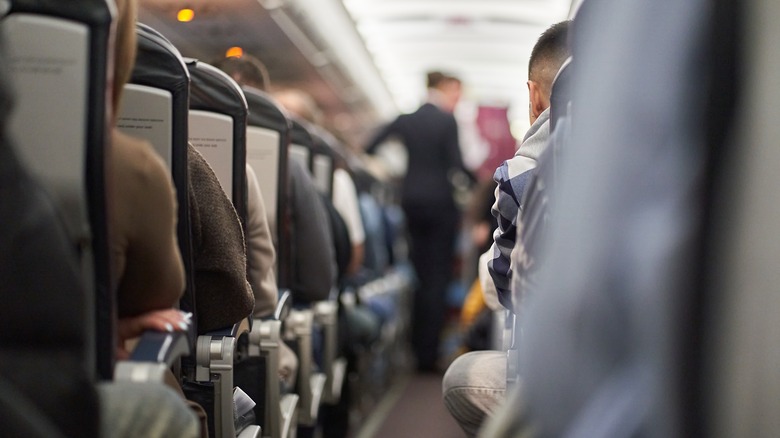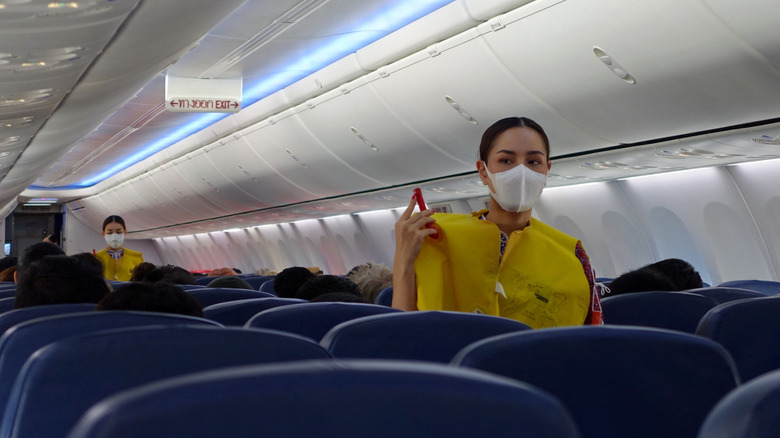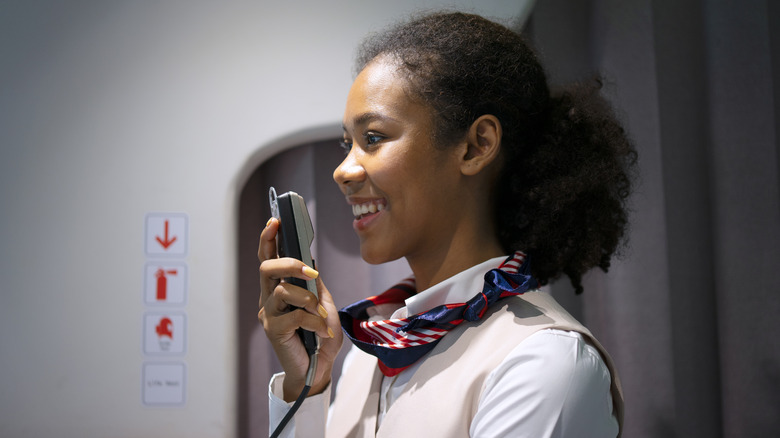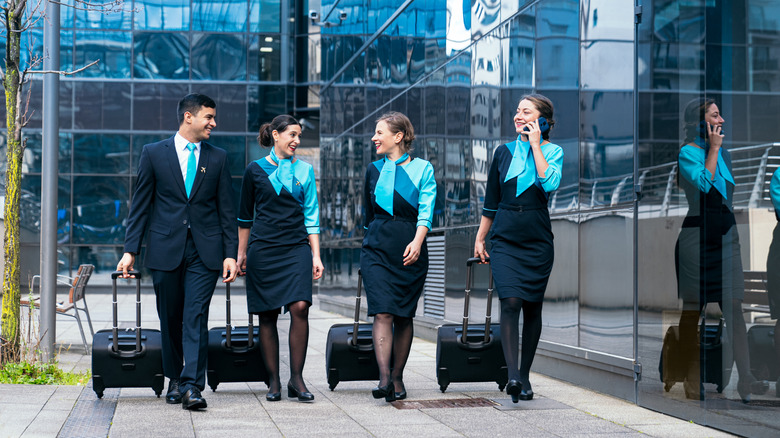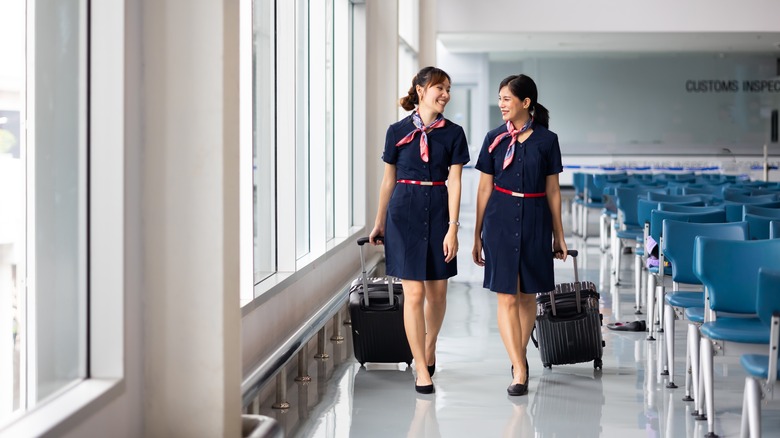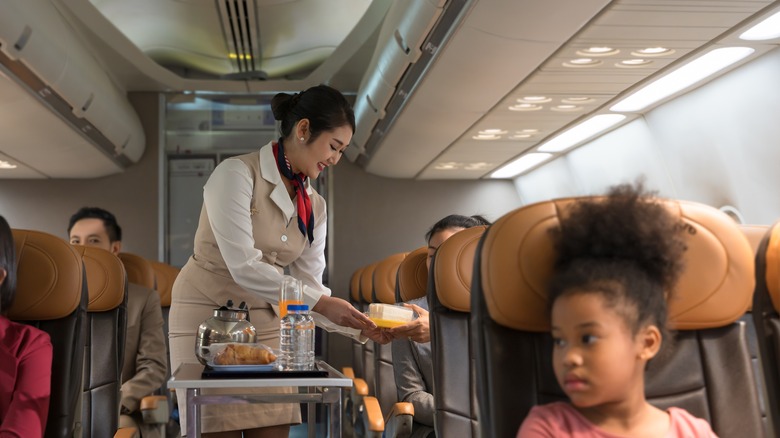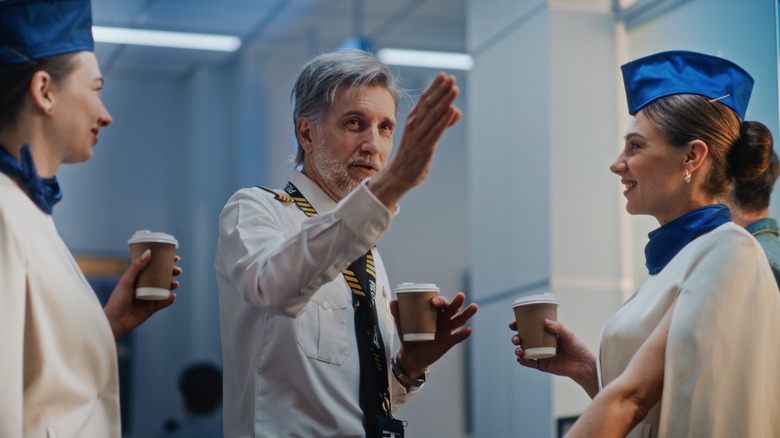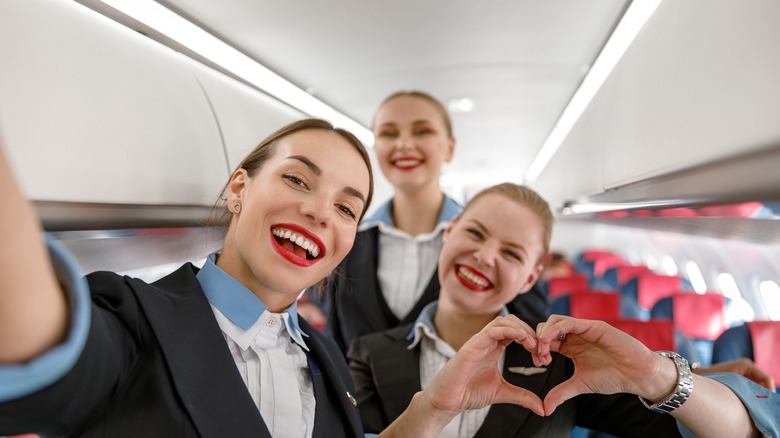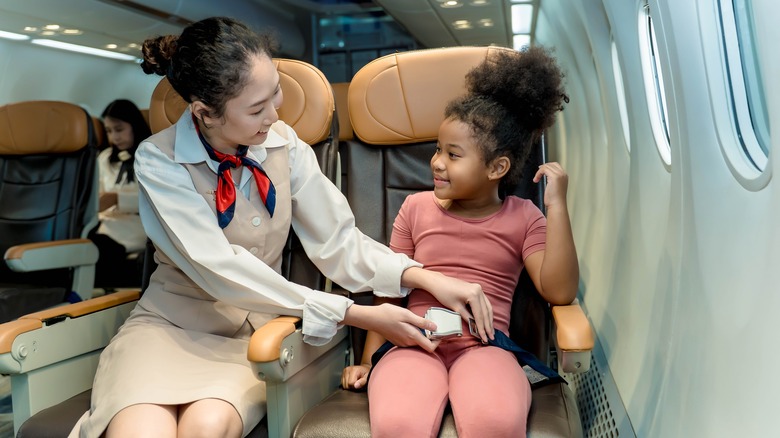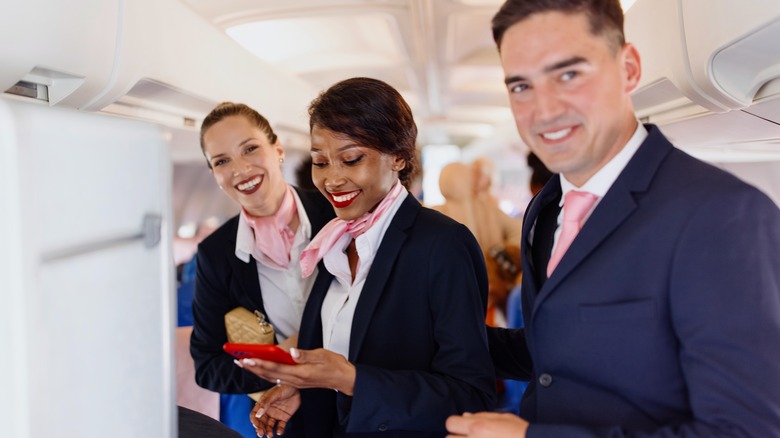Breaking Down The Sneaky, Secret Language Of Flight Attendants
The world of flight attendants is a strange one. Sure, it's a job like any other, but the mysterious nature of our in-flight carers' lives always feels a little foreign. They're constantly bouncing between different destinations, building their own little jet-lagged eco-system, and dealing with us at both our travel-expectant, jubilant best and our travel-weary, whining worst. Complimentary travel might be a trade-off, but when you learn what free flights actually mean for flight attendants, it's not as glamorous as it seems. They're at our beck and call, but also the ones expected to jump into action should the worst happen.
With all that in mind, it's no wonder flight attendants have built their own secret language to communicate well above the understanding of us mere mortals. The odd subculture and lifestyle that's developed over decades of air travel is unique, and hopefully, grasping some of their jargon can lend a little sympathy to their cause. Some of these terms are serious, allowing them to deal with what could be a real issue with some discretion, avoiding passenger panic in the process. Others are more jovial, functioning as amusing little coping mechanisms when dealing with a tough passenger.
Whatever they're using it for, it's a constant source of intrigue for passengers, who are forever straining their ears to catch a bit of in-flight gossip or read into a knowing look mid trolley run. But for flight attendants, it's the difference between chaos and control. We're going to peer behind the curtain and break down some of the sneakiest, funniest, and even darker terms that flight attendants use to communicate. Just don't let them know you know. For more, check out the most disturbing secrets flight attendants do not want you to know.
The serious stuff: medical & emergency codes
Let's start with the serious stuff. As in any other profession with a degree of danger, emergency systems are always in place. Things go wrong, big and small. But when something takes a turn at 35,000 feet with 350 unwitting passengers to care for, flight attendants must react with poise and avoid creating any panic. Codewords, acronyms, and other veiled phrases allow attendants to communicate with each other in front of passengers without raising an alarm.
Acronyms like INAD, DEPU, and DEPA are used to identify passengers who require special protocols. INAD means inadmissible passenger, which is someone who will be denied entry at their destination; DEPU signals a deportee traveling alone; and DEPA identifies a deportee under escort. All three of these require specialized protocols, but referring to them as such can cause alarm to other passengers who can jump to conclusions or put the passenger themselves in an uncomfortable situation.
A darker term is "Code 300", often referred to in the cabin as "Angel" by flight attendants. A Code 300 is the term used to convey to air traffic control that a passenger has died on board and to make the necessary arrangements at the airport. To avoid any distress among passengers, flight attendants will often inform each other in the cabin by saying, "We have an angel on board". Terms like "Code Yellow" are non-threatening medical emergencies, while one you definitely don't want to hear is "Squak 7500," which suggests there could be a hijacking taking place.
Boarding & passenger behavior slang
The boarding gate is, almost without fail, where the worst sides of humanity emerge. Regardless of any organizational systems in place to make boarding as fluid as possible, passengers take it upon themselves to put their own convenience first. But it's here where flight attendants get their first glimpses of their wards for the day, and they identify the problem-people early with amusing nicknames.
"Gate lice" are the people crowding the boarding area well before their group has been called. These antsy passengers block others and add to the air of chaos often found at the gate. And then there's the "Mermaids", pesky creatures that only appear once boarding is complete. Nothing to do with the ocean, these passengers sprawl their legs and arms into the aisle or across seats, creating frustrating obstacles for everyone on the plane.
If there's one thing you never want to be referred to, it's "Phillip". Unless, of course, your name actually is Phillip. This nickname is attributed to passengers identified as a problem, whether they're needy, rude, or a genuine issue for others on board. It's not just a randomly assigned moniker. It stems from "PILP" or "Passenger I'd Like to Punch", and was expanded to the similar-sounding Phillip to make it harder for passengers to put two and two together. A Phillip might be someone who's committed one of these seemingly polite acts, but the flight attendants hate. On the flip side, these simple behavior tips can go a long way with your flight attendant.
Operational jargon (what you hear over the PA)
Not everything is hidden or veiled from passengers. Some of these codes are broadcast throughout the cabin, although most of us remain in the dark about what's actually being said. Some are instructions coming directly from the cockpit, while others are from another attendant.
Take "doors to arrival, disarm your doors", for example. It sounds simple enough. Maybe there's a lock somewhere required for the passengers to disembark? It's actually far more specific and relates to the emergency slides that erupt from the plane in an emergency. If any other doors are opened at the gate without disarming the doors, the slide would fly out and cause an expensive accident. A similar phrase is "sterile cockpit". Nothing to do with cleaning, when a sterile cockpit is enforced, none of the flight crew should be doing any duties other than those that are required for the safe operation of the plane. This is usually only enforced during critical moments like takeoff and landing.
A phrase like "all call" might sound a bit like dead air on the intercom, but it's actually one of the most important calls a flight attendant makes. The all call is the moment when each attendant checks in over the intercom to confirm their doors are secure and their section is ready. Without a successful all-call, the plane is going nowhere. Similarly, what "crosscheck" means to flight attendants is for one flight attendant to verify another's task, ensuring that the full procedure has been followed every time. It may sound redundant, but redundancy is exactly what makes aviation one of the safest industries in the world.
Gossip & social codes
With no such thing as a normal nine-to-five in the flight attendant world, humor and camaraderie can go a long way in keeping everyone sane. A fourteen-hour flight is no walk in the park, and the little moments shared between attendants can help make a rough shift bearable. But, of course, in an industry where customer service comes first and there are few places to hide, workers get creative about their in-jokes.
An informal "cheerio" when you leave the plane might sound like a playful way to say goodbye, but in many cases, it's the flight attendant signalling to their colleagues that they think you're good-looking. Keep that in mind next time you're getting off the plane. During the flight, you might catch wind of a "Bob" which means "best on board". If it's referenced towards you, you can rest well in confidence knowing you're one of the favorites and the flight attendants enjoy serving you.
Of course, as generations come and go, these terms may change, but keep an ear out for these tried and true nicknames. With all that said, it's vital to remember that this is banter between workers. Flight attendants need to maintain a high degree of professionalism, and even if you think you might be on to something, it's best to let them stick to their work and carry on with service.
Crew life & workload terms
As passengers, we only see one side of the flight attendant lifestyle. But behind the polished uniforms and perma-smiles is a day-to-day world dictated by constant travel, irregular schedules, and last-minute shifts. The crew slang mirrors that reality, and can offer an interesting insight into their lives beyond disembarkation.
"Crash pad", for example, is a shared apartment near the airport that's often rented by several flight attendants who need somewhere to sleep between shifts. It's often crowded, temporary, and full of rotating roommates. It's a makeshift solution to the demands of unpredictable rosters. Spare a thought if you hear one of your attendants is heading to their own bed. Plus, it probably means they're back at it early the next day.
You may have seen what seems like a lazy flight attendant hanging around in a vacant seat on the plane. Nothing could be further from the truth, though. This is what's called a "deadhead", and it's a flight attendant who's being repositioned for their next assignment. This could be due to a staffing issue elsewhere, or just a simple rotation, but they're definitely not there to dodge duties. Someone who might be dodging some duties by doubling down on others is a "galley king or queen". A galley queen or king is someone who prefers staying in the galley, managing meals and equipment, rather than working the aisles. It's not an insult; in fact, galley duty requires serious organizational skills.
Food & drink codes
Airplane food is always contentious. There's no denying it's better now than it's ever been, but after decades of being the culinary bottom of the barrel, there were bound to be a few tongue-in-cheek nicknames developed by the flight crews.
Don't get too excited if you hear Tom Cruise being brought up. The A-lister isn't on the plane (and definitely wouldn't be in economy if he were). It's just your flight attendants using his name to remember which side of the trolley the tea and coffee go. Tea is on the left, while coffee is on the right. Easy to remember, and far fewer annoyed passengers.
One thing that may be worth asking about is "crew juice". Over the decades, flight attendants have become pros at throwing together some unique alcoholic concoctions with the few ingredients available to them, and often compete with each other for who makes the best. Of course, they're not enjoying them till after the flight, but nothing is stopping you from asking one if they feel like getting creative. And don't forget about "blue juice." In this context, it's a running joke, a reminder that while crew serve drinks in the cabin, the only liquid they never want to see near passengers is the bright blue lavatory fluid.
Leadership & hierarchy
Airlines operate on strict hierarchies, and the jargon reflects it. But not all of these are official designations and are the equivalent of which friend in the group gets the best bedroom in the Airbnb. Knowing the official ones can be helpful, though, especially if you're in a situation where you might need some extra help with a child or maybe a person with disabilities. With that said, in an emergency, don't be the person who tries to overassume their use. Knowing some of the phrases can help, but it's always best to let the professionals do their job.
The person to know is the CSD, short for cabin service director. They are the lead flight attendant, responsible for overseeing the entire cabin. At some airlines, the title is purser, but the role is the same: manage the crew, coordinate service, and ensure safety procedures are followed.
And then there's the "cartel." It's an informal nickname whispered among flight attendants to describe cliques of ultra-senior crew who've essentially cornered the best routes, layovers, and shifts. These groups can quietly wield serious influence, swapping tips on scheduling loopholes, protecting their preferred rosters, and keeping newcomers firmly in their place. Attendants generally get paid for the time they work, so longer routes are sought after, with the cartels doing what they can to push newer recruits to the shorter domestic routes. Flight attendants claim every airline has its own version of this, and there are even some suggestions (which add to the mafia-sounding aspect) that some even accept payment for swapping desirable routes. This does seem to be frowned upon, though, for obvious reasons.
Sky humor & insider jokes
Not every code is serious. Some are pure comic relief and can help them cope with the little frustrations they deal with on a day-to-day basis. Remember, flight attendants are dealing with most of us at our absolute worst, so give them a little grace. With that said, some, as you'll read, you'll wish you never found out about. First up is the "landing lips". A technical term for something going on with the landing gear? Not quite. This term refers to the last-minute touch-ups that some flight attendants rush to do right before touchdown. They can't be waltzing through the airport and out to the bar without looking their best, can they?
One that feels a little mean, as we shouldn't technically judge, is "miracle flight". It refers, amusingly, to a passenger who needs a wheelchair to board but, miraculously, doesn't need one when getting off. While, of course, some situations are unique, the assumption is that the passenger is taking advantage of the system when it suits them. Or the plane just really is that magical. Another favorite term is crotch watch, something you can help your flight attendant with. It's not as weird as it sounds — it's just checking your seat belt is fastened.
Now for the one that might ruin your day and have you questioning everything you smell on your next flight. Crop-dusting. If you've never heard of it, it's a slang term for when a crew member lets one slip while walking down the aisle and leaves everyone behind to deal with it. Understand the image now? Even worse is that it's sometimes done deliberately next to an annoying passenger. All the more reason to treat the crew with respect. Is it crude? Yes. Is it gross? For sure. Kinda funny? Definitely.
Secret passenger labels
Some passenger labels aren't just for fun. They're an important part of the crew's daily operations and dictate how they interact with passengers during emergencies. Many of these terms (mainly acronyms) are used well in advance of boarding, so the crew know to look out for them, while others are assigned as the passengers enter.
You might think that attendants greeting you as you board is just good customer service, but it's actually how they look out for specific things. For example, ABP stands for able-bodied person. An attendant will note this person, often a strong or fit-looking passenger who could be of assistance in an emergency. Sometimes, if an emergency exit row hasn't been filled, someone at the ticketing desk may notice an ABP and assign them for that reason — it's not just to be nice.
At the opposite end of the spectrum, PRM stands for person of reduced mobility. This is equally important information as the crew can prioritize assistance or place them in a seat that won't endanger them or slow down any other processes in a worst-case scenario. VIP is an obvious one, standing for very important person. "UM" means unaccompanied minor, and "non-rev" refers to a non-revenue passenger — typically airline staff flying standby.
Methodology
My research on this article started on flight attendant Reddit pages, where I honed in on phrases that appeared multiple times, suggesting broad usage. Each one was then verified using a number of different sources, including blogs, websites, and other flight attendant resources for some of the more official-sounding ones.
